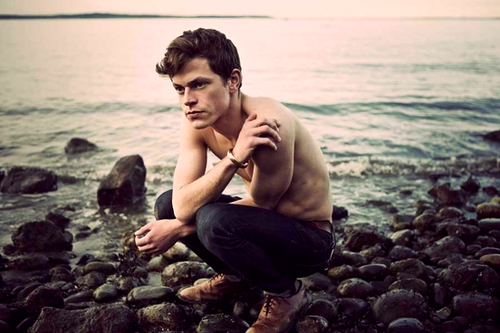“NO FAMILY is safe when I sashay,” sings Mike Hadreas, otherwise known as “Perfume Genius,” on “Queen,” the haunting first single on the new album Too  Bright. The video for “Queen” is the deranged lovechild of Fellini and Waters, a bizarre escapade in which the 32-year-old Hadreas cruises an Elvis impersonator with a prosthetic leg only to jump off a rooftop. Depending on your interpretation, Hadreas either dies or metamorphoses into a cheerleader. The video for “Hood,” from 2012’s Put Your Back N 2 It, became somewhat infamous after the bearish porn star Arpad Miklos, who cradles Hadreas and brushes his hair, later died in an apparent suicide.
Bright. The video for “Queen” is the deranged lovechild of Fellini and Waters, a bizarre escapade in which the 32-year-old Hadreas cruises an Elvis impersonator with a prosthetic leg only to jump off a rooftop. Depending on your interpretation, Hadreas either dies or metamorphoses into a cheerleader. The video for “Hood,” from 2012’s Put Your Back N 2 It, became somewhat infamous after the bearish porn star Arpad Miklos, who cradles Hadreas and brushes his hair, later died in an apparent suicide.
Too Bright, co-produced by Portishead’s Adrian Utley, has garnered critical acclaim, including from Rolling Stone, which ranked it among 2014’s best albums (“shifting from theatrical indie pop one minute to pitch-black electronic music the next”), to The New Yorker, which evoked everyone from John Keats to Rufus Wainwright in its praise. Too Bright is indeed a stroke of genius: melodic, melancholic, and totally original.
While on tour, Hadreas spoke with me by telephone from Seattle, which happens to be his home town.
Colin Carman: I think your piano playing is especially good on “No Good” (a song from Too Bright). When did you first discover music and the piano?
Mike Hadreas: I started playing piano around six or seven and very much because I wanted to. I wasn’t forced into it. Even though I loved playing, I was a very bad student. I eventually found a teacher who wasn’t fed up with me. I didn’t start making fully formed songs until not that long ago, really, not long before I released my first album.
CC: What were your earliest musical influences?
MH: Growing up, I identified with things my parents listened to, like Leonard Cohen. When I was a teenager, I became obsessed with a lot of badass women like Liz Phair and Fiona Apple. Deadly serious ladies. PJ Harvey, for sure.
CC: Congratulations on landing Matador Records as a label, once home to pioneering indie-rock acts like Liz Phair, Yo La Tengo, and Pavement.
MH: Thanks. I remember buying Liz Phair’s Whip-Smart with my babysitting money. Then I went back and bought her [1993 debut] Exile in Guyville.
CC: What was the first openly gay song that you wrote? Has your sexuality always been part of your songwriting?
MH: When I first started writing, it was just writing for me. There were gay themes because I’m a gay person. So it wasn’t a deliberate statement, at first. With the new album, I knew more people were going to hear it, so it was important to me to be specific and explicit and direct. It was powerful for me, and I hoped it would be powerful for people to hear it. I have a sense of duty about that.
CC: Why Perfume Genius? It’s kind of an audacious name, no?
MH: When I first started writing my songs, I intended to just share them with some friends. Then I made a MySpace profile to put my songs up, and I didn’t give it any thought. It was just gibberish. I don’t mind it and I like the way the words look together.
CC: Your new album sounds different in many ways from your debut, Learning, from 2010, and the follow-up, Put Your Back N 2 It. Is it the great leap forward that the music press makes it out to be?
MH: I didn’t think of it as a grand departure, but I understand the need to market it like that. For me, I was just shaking up my own limitations. I thought, well, I’m really going to go for it, so I started screaming, improvising, writing over distortion and noise. I just stopped being locked behind piano chords. I took everything more seriously: recording, instruments, live shows.
CC: The videos for “Queen” and “Grid” are surreal. Did you enjoy making the videos?
MH: When I first started making music, I would make my own videos for each song. Even when I’m writing, I have a visual mood in mind for how things should look. For “Grid,” I had this idea of pulsating dancers around me. It ends up being more a collaboration with the director. With both of those videos, everybody’s crazy ideas are jumbled into a dream sequence. That’s how I like it.
CC: What about the song “I’m a Mother,” which sounds to me like the most gothic song on Too Bright? Where did that come from?
MH: My boyfriend and I have been together for five years and I want a house. He really wants kids, which is not something I ever thought about. It’s the same thing with marriage. Because I’m fairly dramatic, I began thinking about weirder questions, like why we can’t just have a child and what’s driving me to have sex with him if I’m not looking for a healthy father for my child. There’s nothing coming from our sex, and there’s nothing wrong with that. Then there are sad things like my mom making baby things for her grandchild. That song raised nice, sweet questions. But instead I shared a weirder, achier feeling about giving birth without my boyfriend, without anyone, on my own in a dark pit.
CC: One recurring theme on the album is the body and corporeality. How does the body matter, and do you think, as gays and lesbians, our relationship with our bodies is different than that of straights?
MH: Sure. For me, when people started catching on, around the seventh grade, that I was different and giving me side-eyes, I became extremely self-aware about how I came across. That became more important to me than how I actually felt. That can twist into an obsession with your body and face. It becomes an easy place to go.
CC: How do you stay healthy and well-adjusted while on tour?
MH: I don’t! I treat myself like shit, but I put really expensive cream on myself. It’s horrible. I don’t exercise. I smoke. I eat like shit. But then I detox with a coconut water or research some $200 exfoliant.
CC: Last question: Madonna or Lady Gaga?
MH: Oh, Madonna. Actually, I cover Sade’s “By Your Side” and Madonna’s “Oh Father,” which was a non-hit for her: depressing and dark.
Colin Carman teaches British and American literature at Colorado Mesa University.





